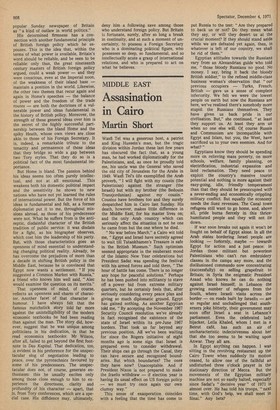MIDDLE EAST
Assasination in Cairo
Martin Short
Wasfi Tel was a generous host, a patriot and King Hussein's man, but the tragic division within Jordan these last few years has obscured the fact that, as a young man, he had worked diplomatically for the Palestinians, and, as once he proudly told me, his uncle was the General who saved the old city of Jerusalem for the Arabs in 1949. Wasfi Tel's life exemplified the Arab proverb, "I will fight with my cousin (the Palestinian) against the stranger (the Israeli) but with my brother (the Bedouin Transjordanian) against my cousin." Cousins have brothers too and they surely despatched him in Cairo last Sunday. His death, however, makes little difference in the Middle East, for his master lives on; and the only Arab country which can seriously affect the situation is not he one he came from but the one where he died.
"No war before March," a Cairo wit told me, "Egypt and Israel have secretly agreed to wait till Tutankhamen's Treasure is safe in the British Museum." Such optimism seemed appropriate in the exuberant mood of the Islamic New Year celebrations but President Sadat was spending the festival With his armed forces and told them, "The hour of battle has come. There is no longer any hope for peaceful solutions." Perhaps he has been pushed into militancy to stave off a power bid from extreme military quarters, but he certainly feels that, after seriously considering every peace plan and giving so much diplomatic ground. Egypt has gained nothing. As another Egyptian told me, "By accepting the November 1967 Security Council resolution we've already In fact recognised the existence of the state of Israel within its pre-June 1967 borders. That took us far beyond any previous position. All we've been waiting for since the Rogers initiative of eight months ago is some sign that Israel is prepared even to consider withdrawal. Their ships can go through the Canal, they can have secure and recognised boundaries. But which boundaries? The ones they have now? Unacceptable. And if President Nixon is not prepared to make the Iraelis withdraw — if election year is having its usual effect on US foreign policy — we must try once again our own clumsy way."
This sense of exasperation coincides with a feeling that the time has come to put Russia to the test: "Are they prepared to back us or not? Do they mean what they say, or will they desert us at the crucial moment? If they should stand aside while we are defeated yet again, then, in whatever is left of our country, we shall be rid of them."
Egyptian attitudes towards the Russians vary from an Alexandrian guide who told me, "those bloody Russians no good. No money. I say, bring it back the bloody British soldier," to the refined middle-class business woman's observation that "our previous occupiers — Turks, French, British — gave us a sense of complete inferiority. We felt we were the lowest people on earth but now the Russians are here, we've realised there's somebody more stupid: the Russians themselves. , They have given us back pride in our civilisation. But," she continued, "at least they support us. At least they arm us when no one else will. Of course Russia and Communism are incompatible with Egypt and Islam, but you, the West, have sacrificed us to your own enemies. And for what?"
Egyptians know they should be spending more on relieving mass poverty, on more schools, welfare, family planning, on electrification, industrial expansion and land reclamation. They need peace to exploit the country's massive tourist potential and nothing is more against their easy-going, idle, friendly temperament than that they should be preoccupied with a never-ending and economically crippling military conflict. But equally the economy needs the Suez revenues. The Canal town refugees still want to go home, and, above all, pride burns fiercely in this thricehumiliated people and they will not lie down.
If war soon breaks out again it won't be fought on behalf of Egypt alone. In all the Arab states bordering Israel people are looking — forlornly, maybe — towards Egypt for action and a just peace: in Jordan those militant but powerless Palestinians who can't run embroidery classes in the camps any more, and the disillusioned commando now concentrating (successfully) on selling grapefruit to Britain; in Syria the enigmatic President Asaad who knows he can do nothing against Israel himself; in Lebanon the growing number of refugees from the South, where Israeli visits across the border — on roads built by Israelis — are so regular and unchallenged that southerners joke bitterly, their government may soon offer Israel a seat in Lebanon's parliament. Even the celebrated lady hijacker, Leila Khaled, whom I met in a Beirut café, has such an air of uncharacteristic indecisiveness about her that she too seems to be waiting upon Anwar. They all are.
In Egypt anything can happen. I was sitting in the revolving restaurant up the Cairo Tower when suddenly its motion ceased, to allow one of the failhful an undisturbed three o'clock prayer in the stationary direction of Mecca. But the movements of the Egyptian military machine are not so easily halted, especially since Sadat's "decisive year" of 1971 is almost over. He has told his troops, "next time, with God's help, we shall meet in Sinai." Any bets?










































 Previous page
Previous page